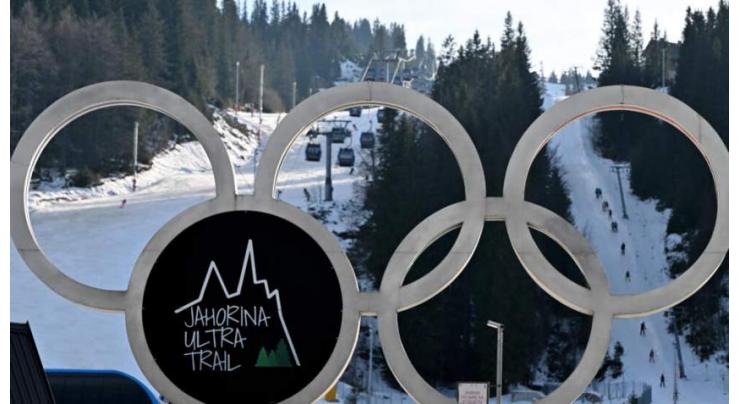
Pride And Sadness: 40 Years On Sarajevo Remembers Its Olympics
Muhammad Rameez Published February 08, 2024 | 08:43 PM

Four decades after Bosnia's capital Sarajevo hosted the Winter Olympics, residents remember the event with a mixture of pride and melancholy that marked one of the last unifying moments in Yugoslavia before war destroyed the country
Sarajevo, (APP - UrduPoint / Pakistan Point News - 8th Feb, 2024) Four decades after Bosnia's capital Sarajevo hosted the Winter Olympics, residents remember the event with a mixture of pride and melancholy that marked one of the last unifying moments in Yugoslavia before war destroyed the country.
Kasim Djaka was among 60,000 people who attended the lavish inaugural ceremony at the Kosevo stadium on February 8, 1984.
"I was proud. But not just me, we all were, all of Yugoslavia was proud," the 75-year-old told AFP.
"It was its most beautiful event."
At the time, Bosnia was one of the six republics that made up socialist Yugoslavia that for decades had remained neutral in the Cold War and offered a softer version of communism.
But even as the Olympics offered a symbol of harmony, cracks were already emerging that exploded into a string of inter-ethnic conflicts across the federation in the 1990s.
The meltdown eventually climaxed with a bloody civil war in ethnically diverse Bosnia that saw more than 100,000 people killed, including 11,000 in Sarajevo alone.
Ironically, it was Bosnia's diversity that helped secure its spot as an Olympic host.
"The games were held here because this is a place where people mixed. We were united, strong," said Djaka.
But for Ahmed Karabegovic -- who served as secretary general of the Sarajevo Olympics -- the city's candidacy was unlikely from the beginning when Bosnia beat out the wealthier nations of Sweden and Japan.
- Peace and war -
At the time of its selection as the host city, Sarajevo had just one ice rink and a ramshackle ski resort with a single chairlift.
New roads, an airport and residential areas along with a slew of sports facilities were constructed in just a couple years, relying on legions of labour recruited from across Yugoslavia.
"It must be said that everyone in our former country took part in it," said former crane operator Dzemo Salihovic, as he walked along the now derelict bobsleigh track that winds through a pine forest overlooking Sarajevo.
The track would later serve as a frontline position during the war and remains a tourist destination where bullet holes from the fighting are still visible.
Most of the Olympics infrastructure was destroyed during the war that raged from 1992 to 1995, with Bosnia Serb political leaders and fighters commandeering a hotel during the siege of Sarajevo that once hosted tourists at the Games.
The stunning reversal of the city's fortunes lingers bitterly in the mind of residents with living memories of both the Olympics and the war that followed.
"The Olympics ensured that Sarajevo becomes the centre of the world for those 14 days and then the centre of Yugoslavia until the 1990s and the start of the war," said Eldin Hodzic, a historian at the Sarajevo Olympic Games museum.
Related Topics
Recent Stories

Currency Rate In Pakistan - Dollar, Euro, Pound, Riyal Rates On 4 May 2024

Today Gold Rate in Pakistan 04 May 2024

Pakistan marks World Press Freedom Day

High-level Saudi business delegation due on May 5

Stocks heat up as US labour market cools

President approves Tax Laws (Amendment) Bill 2024

Implementation of merit, justice to oppressed segments top priorities: CPO

Overseas Kashmir community delegation calls on AJK President, discusses latest s ..

Govt believes in freedom of press: Amir Muqam

Labour urges UK election after Tory losses

Health authorities asked for action against alleged illegal tenders at Services ..

Spain scraps national bullfighting prize sparking debate
More Stories From Sports
-
Cricket: Bangladesh v Zimbabwe 1st T20 scores
12 hours ago -

Labour urges UK election after Tory losses
12 hours ago -

Spain scraps national bullfighting prize sparking debate
12 hours ago -

Tennis: ATP/WTA Madrid Open results
12 hours ago -

Chelsea shatter Spurs' top four bid
12 hours ago -

4th Union Club Gatorade Trophy ranking tennis championship begins
13 hours ago
-

Bill May or may not make Olympic history in the pool
13 hours ago -

Bill May or may not make Olympic history in the pool
13 hours ago -

Talent Identification Workshop from Saturday
13 hours ago -

ICC announces match officials for T20 World Cup 2024
14 hours ago -

Masha, Army, KRL, PACA triumph in National Challenge Cup matches
14 hours ago -

PCB Level-I Umpiring Courses for Umpires 2024-25
15 hours ago










